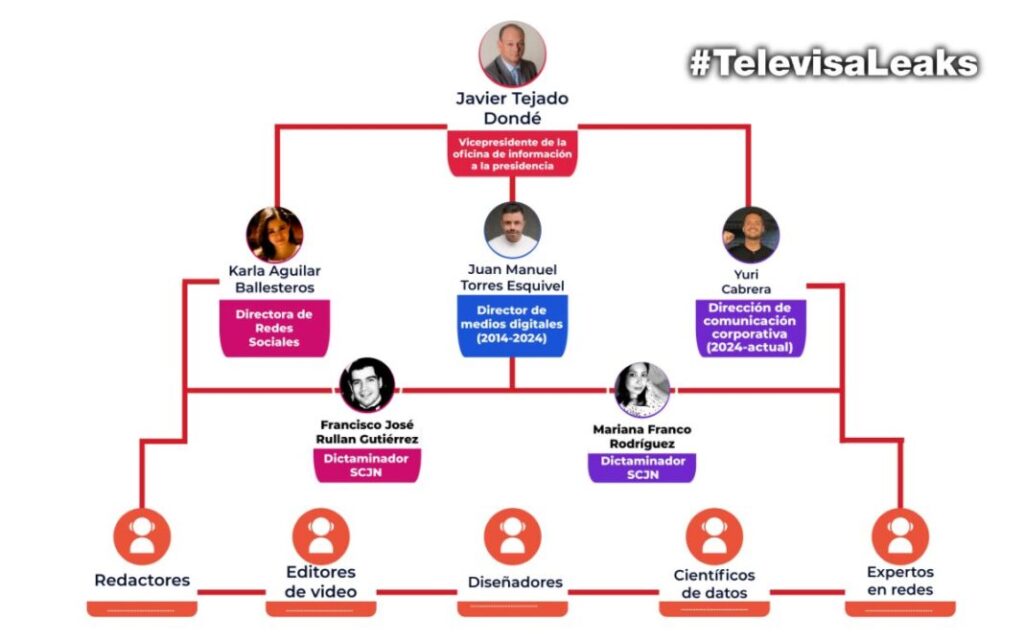A Story of Power, Manipulation, and Decline
For decades, Grupo Televisa was the undisputed standard of Mexican television. Founded in 1930 by Emilio Azcárraga Vidaurreta, it became not only the most influential content producer in Latin America but also a dominant cultural force, shaping public opinion and politics. However, in recent years, its name has become increasingly associated with discredit rather than entertainment. Allegations of media manipulation, corruption scandals, extortion attempts, and a deepening financial crisis have severely weakened its legacy.
The Emergence of TelevisaLeaks
On April 27, 2025, the investigative team at Aristegui Noticias reignited national debate by publishing the #TelevisaLeaks investigation. This series of reports revealed the internal workings of a covert unit within the company known as “Palomar”, dedicated to orchestrating smear campaigns against political, business, and media rivals using bots, disinformation, and fabricated news.
The exposé was made possible by Germán Gómez García, a former video editor in the unit, who provided journalist Carmen Aristegui with over 5 terabytes of evidence documenting manipulation operations carried out from 2017 to 2024 inside Televisa Chapultepec.
“I had to replicate the graphic style of Sopitas to create a video that appeared to warn against flying with Interjet,” Gómez admitted, one of the unit’s key technical operators.
“Palomar”: The Smear Campaign Machine
As documented by Aristegui Noticias, the “Palomar” team operated under the supervision of Javier Tejado Dondé, Televisa’s Vice President of Information. Its mission was to develop targeted attacks through manipulated content, fake publications, impersonation of legitimate media outlets, and the strategic use of bots across social media.
Additionally, the group employed external collaborators—described as “digital mercenaries”—tasked with generating viral attack materials disguised as authentic journalism.

Alberto Ciurana: The Primary Target
Among the most systematically targeted individuals was Alberto Ciurana, a former Televisa executive who, in 2017, joined TV Azteca as Head of Content and Distribution. Shortly thereafter, he became the focus of an aggressive operation dubbed “Mi Villano Favorito” (“My Favorite Villain”), deployed between February and March of 2019.
According to internal documents, the operation involved over 24,000 hostile tweets, 20 Facebook posts, and more than 45 Google-indexed articles, reaching more than 18 million people.
“The audience rules, not the bots on social media,” Ciurana wrote in response to the ongoing campaign.
The attacks accused him—without evidence—of leaking intimate images of public figures like Luis Roberto Alves “Zague” and Patty López de la Cerda, while also claiming he had conflicts with Paty Chapoy and Antonio Rosique.
You might be interested in: TelevisaLeaks: The Perfect Timing to Execute Technoauthoritarianism
“At this rate, even climate change will be my fault,” Ciurana quipped on X weeks before his death due to COVID-19 in March 2021.
After his passing, internal chats revealed the team’s callous reaction.
“Beating Azteca to the eulogy—winning exclusives even in death,” wrote Francisco Rullán, a member of the Palomar group.
Propaganda, Elections, and Fabricated News
Televisa’s involvement in political communication strategies dates back more than a decade. As revealed by The Guardian in 2012, the network developed a media campaign to favor Enrique Peña Nieto’s presidential run while undermining his opponents. The report included documents, videos, and receipts supporting the claim.
The network has also been accused of airing staged news. Two prominent examples include the Florence Cassez case (2005), where a live broadcast simulated an arrest operation, and the “Frida Sofía” episode during the 2017 earthquake—reporting on a child trapped under rubble who, in reality, never existed.
Political Extortion and Economic Pressure
On April 6, 2024, President Andrés Manuel López Obrador publicly denounced from the National Palace that Televisa had attempted to extort Rocío Nahle, then a candidate for Governor of Veracruz, demanding 200 million pesos in exchange for not releasing allegedly damaging information about the Dos Bocas refinery.
“They demanded 200 million from Rocío Nahle at Televisa… and since she didn’t pay, they went after her,” the President stated.
The media outlet SinEmbargo later confirmed that an emissary linked to Bernardo Gómez, Co-President of Grupo Televisa, had made the demand during the electoral campaign.
Internal Scandals and Corporate Restructuring
In 2024, TVyNovelas reported on an internal fraud investigation tied to the reality show ¿Quién es la máscara? (Who’s the Mask?), implicating television personality Galilea Montijo and publicist Danna Vázquez. Although Montijo publicly denied the allegations, she announced the termination of her professional relationship with Vázquez via Instagram.
Simultaneously, the company initiated a severe restructuring plan: canceling long-running programs like Vecinos and Como dice el dicho, rejecting new series for its ViX streaming platform, and ending exclusive contracts with veteran stars such as Andrea Legarreta.
Financial Crisis: A Measurable Decline
According to data from Statista and the company’s annual reports, Televisa’s financial situation deteriorated significantly between 2019 and 2024:
- Asset value dropped from MXN 290 billion to MXN 262 billion.
- Sky’s revenue fell by 13.5% in 2023.
- Net cash reserves halved from MXN 27 billion to MXN 15 billion.
- Over 10,000 jobs were lost, and cable TV subscribers declined.
As a result, the company’s shares on the Mexican Stock Exchange plummeted 25%, while its NYSE ADRs suffered a nearly 30% drop.
FIFA Gate and the Exit of Emilio Azcárraga Jean
By late 2023, Televisa became entangled in the FIFA Gate corruption scandal, accused of paying millions in bribes to secure World Cup broadcasting rights for 2018, 2022, 2026, and 2030.
According to La Jornada, the company reached a $95 million settlement in a class-action lawsuit filed by U.S. investors. In response to growing legal pressure, Emilio Azcárraga Jean stepped down as Chairman of the Board on August 30, 2024.
“The Company cannot predict the outcome of the investigation… We are cooperating with the authorities,” Televisa stated in a filing to the Mexican Stock Exchange.
A Television Empire Losing Public Trust
What was once the dominant Spanish-language media empire now faces a perfect storm: falling revenues, eroded credibility, ongoing legal threats, and an audience that no longer believes its narratives. As documented by outlets like Aristegui Noticias, The Guardian, SinEmbargo, La Jornada, TVyNovelas, and Sopitas, Televisa’s legacy of influence has been replaced by controversy.
The verdict is no longer rendered on the screen, but in the public’s conscience—one that has learned how to change the channel.

